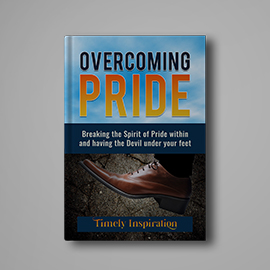Instructions on how to show God appreciation abound throughout the Bible (Psalm 106:1; 107:1; 118:1; 1 Chronicle 16:34; 1 Thessalonians 5:18). Most verses go on to list attributes of God for which we should praise Him, such as “His love endures forever” (Psalm 136:3), “He is wonderful” (Psalm 118:29), and “His benevolence is everlasting” (Psalm 100:5). The act of offering gratitude is inseparable from the act of expressing praise. Praising and worshiping God is not enough if they don’t come with a grateful heart.

The emotion of gratitude keeps our hearts in the right place about the giver of all good gifts. Thankfulness also acts as a useful reminder of how fortunate we are. As a species, we tend to be quite possessive. The things we don’t have tend to dominate our thoughts. Showing appreciation for what we have helps keep us mindful of our blessings. Focusing on what we have rather than what we don’t give us a sense of contentment. When we stop to thank God for the many blessings in our lives, we start to see them in a new light. Without God’s merciful blessings, we wouldn’t even be here.
1 Thessalonians 5:18 says, ‘God wants you always to have a thankful heart since this is his will for you in Christ Jesus.’ Everything, including the things we dislike, deserves our gratitude. Choosing to be grateful to God for whatever He allows in our lives is a sure way to avoid bitterness. We can’t have both gratitude and resentment for the same thing. Instead of thanking God for the bad things that happen to us, we should thank Him because He helps us get through them (James 1:12). He did not cause the pain. Still, we express thanks to Him whenever He provides the strength to endure it (2 Corinthians 12:9). For His promise that “to those who love God and are called according to His plan, everything will work together for good,” we offer Him gratitude (Romans 8:28).
It’s possible to have a grateful heart toward God even when we’re not feeling very appreciative of our circumstances. It’s possible to be grateful even when experiencing great loss. We may be thankful despite our hardships. However infuriated we become because of our sin, we nevertheless have reason to thank God. It is called a “praise offering” in the Bible (Hebrews 13:15). By keeping our hearts in the right place concerning God, we may avoid many of the bad emotions and thoughts that might otherwise hinder us from experiencing the tranquillity he intends for us to enjoy (Philippians 4:6–7).
As Christians, we are responsible for praying, loving our neighbors, and giving generously. We can keep on with the list. And although the vast majority of Christians would agree that these are vital components of the Christian life, many of us sometimes fall short. Making time for spiritual development frequently takes a back seat to meeting our personal needs and fulfilling our other obligations. That’s also true of the times we’re prompted to be thankful.
Several passages in the Bible stress the importance of being thankful at all times. However, practising gratitude is difficult. Like any other spiritual training, it requires dedication, hard work, and regular practice. It doesn’t take much to lose one’s heartfelt gratitude. Take the fact that I enjoy good health yet whine when a cold disrupts my busy schedule. Even though I have a well-stocked kitchen and closet, I often say, “I have nothing to wear.” Researchers in the field of moral development psychology have poured a lot of time and energy into understanding the benefits of gratitude and developing strategies for encouraging its widespread adoption. This study gives important insights and suggestions for making gratitude practices work better as a spiritual discipline when combined with scripture.
According to studies, gratitude is distinct from other feelings like happiness or anger since it requires work on the part of the individual. That is to say, we need to recognize the kindness shown to us before we can express our appreciation.
Because of our ability to recognize the kindness of others, gratitude has been dubbed a moral compass. Psychologically, we have a lot of barometers. Anxiety, for example, might serve as a warning signal when danger is present. That warm, fuzzy feeling we receive when in a good relationship is a good analogy. Expressing appreciation for a good deed helps others see the presence of kindness in their midst. How different is experiencing that “warm, fuzzy feeling” from living a life of gratitude? To express gratitude in action rather than just thinking about it is a different thing. A grateful person recognizes that the positive influences in their life stem partially from events outside their control.
Grateful attitudes may be measured along four dimensions: frequency, intensity, breadth, and density. The frequency with which we feel thanks, the intensity of our feelings of joy, the number of objects and people for which we are grateful at any given time, and the number of people for whom we feel gratitude at any given instant are all indicated by these phrases. People with a good attitude are more likely to show gratitude for many things and people.
There is a positive psychological effect from experiencing and expressing thankfulness. God, like any good parent, wants us to appreciate the blessings in our lives (James 1:17). All that we have comes from God, and we should always treat it as such. A lack of gratitude, arrogance, and self-centeredness might flourish. Soon, such will come to believe that he is responsible for his success, ending in eternal destruction. “There is a way which seemeth right unto a man, but the end thereof are the ways of death.” (Proverbs 14:12)
November 21, 2022
What Role Does Gratitude Have In A Christian’s Prayer Life?
Instructions on how to show God appreciation abound throughout the Bible (Psalm 106:1; 107:1; 118:1; 1 Chronicle 16:34; 1 Thessalonians 5:18). Most verses go on to list attributes of God for which we should praise Him, such as “His love endures forever” (Psalm 136:3), “He is wonderful” (Psalm 118:29), and “His benevolence is everlasting” (Psalm 100:5). The act of offering gratitude is inseparable from the act of expressing praise. Praising and worshiping God is not enough if they don’t come with a grateful heart.

The emotion of gratitude keeps our hearts in the right place about the giver of all good gifts. Thankfulness also acts as a useful reminder of how fortunate we are. As a species, we tend to be quite possessive. The things we don’t have tend to dominate our thoughts. Showing appreciation for what we have helps keep us mindful of our blessings. Focusing on what we have rather than what we don’t give us a sense of contentment. When we stop to thank God for the many blessings in our lives, we start to see them in a new light. Without God’s merciful blessings, we wouldn’t even be here.
1 Thessalonians 5:18 says, ‘God wants you always to have a thankful heart since this is his will for you in Christ Jesus.’ Everything, including the things we dislike, deserves our gratitude. Choosing to be grateful to God for whatever He allows in our lives is a sure way to avoid bitterness. We can’t have both gratitude and resentment for the same thing. Instead of thanking God for the bad things that happen to us, we should thank Him because He helps us get through them (James 1:12). He did not cause the pain. Still, we express thanks to Him whenever He provides the strength to endure it (2 Corinthians 12:9). For His promise that “to those who love God and are called according to His plan, everything will work together for good,” we offer Him gratitude (Romans 8:28).
It’s possible to have a grateful heart toward God even when we’re not feeling very appreciative of our circumstances. It’s possible to be grateful even when experiencing great loss. We may be thankful despite our hardships. However infuriated we become because of our sin, we nevertheless have reason to thank God. It is called a “praise offering” in the Bible (Hebrews 13:15). By keeping our hearts in the right place concerning God, we may avoid many of the bad emotions and thoughts that might otherwise hinder us from experiencing the tranquillity he intends for us to enjoy (Philippians 4:6–7).
As Christians, we are responsible for praying, loving our neighbors, and giving generously. We can keep on with the list. And although the vast majority of Christians would agree that these are vital components of the Christian life, many of us sometimes fall short. Making time for spiritual development frequently takes a back seat to meeting our personal needs and fulfilling our other obligations. That’s also true of the times we’re prompted to be thankful.
Several passages in the Bible stress the importance of being thankful at all times. However, practising gratitude is difficult. Like any other spiritual training, it requires dedication, hard work, and regular practice. It doesn’t take much to lose one’s heartfelt gratitude. Take the fact that I enjoy good health yet whine when a cold disrupts my busy schedule. Even though I have a well-stocked kitchen and closet, I often say, “I have nothing to wear.” Researchers in the field of moral development psychology have poured a lot of time and energy into understanding the benefits of gratitude and developing strategies for encouraging its widespread adoption. This study gives important insights and suggestions for making gratitude practices work better as a spiritual discipline when combined with scripture.
According to studies, gratitude is distinct from other feelings like happiness or anger since it requires work on the part of the individual. That is to say, we need to recognize the kindness shown to us before we can express our appreciation.
Because of our ability to recognize the kindness of others, gratitude has been dubbed a moral compass. Psychologically, we have a lot of barometers. Anxiety, for example, might serve as a warning signal when danger is present. That warm, fuzzy feeling we receive when in a good relationship is a good analogy. Expressing appreciation for a good deed helps others see the presence of kindness in their midst. How different is experiencing that “warm, fuzzy feeling” from living a life of gratitude? To express gratitude in action rather than just thinking about it is a different thing. A grateful person recognizes that the positive influences in their life stem partially from events outside their control.
Grateful attitudes may be measured along four dimensions: frequency, intensity, breadth, and density. The frequency with which we feel thanks, the intensity of our feelings of joy, the number of objects and people for which we are grateful at any given time, and the number of people for whom we feel gratitude at any given instant are all indicated by these phrases. People with a good attitude are more likely to show gratitude for many things and people.
There is a positive psychological effect from experiencing and expressing thankfulness. God, like any good parent, wants us to appreciate the blessings in our lives (James 1:17). All that we have comes from God, and we should always treat it as such. A lack of gratitude, arrogance, and self-centeredness might flourish. Soon, such will come to believe that he is responsible for his success, ending in eternal destruction. “There is a way which seemeth right unto a man, but the end thereof are the ways of death.” (Proverbs 14:12)
Recommended Books
These Books Will Change Your Life for Good
- DISCOVERING THE POWER OF A TRANSFORMED MIND: A Daily Guide to Spiritual Transformation and Renewing of Your Mind Power through God’s Words
- PRAYERS FOR FINANCES & PROSPERITY: Discover Simple and Powerful Prayers to Attract Supernatural Financial Breakthrough
- FASTING FOR DELIVERANCE HEALING & SPIRITUAL BREAKTHROUGH: Breaking Through The First and Second Heaven for Manifestation of Blessings and Deliverance
- Praying for My Future Husband: 21 Powerful and Effective Prayer Guide on How to Pray for that Godly Partner You desire in your Life
- How To Hear The Voice of God Clearly and Recognize It: A Powerful and Effective Guide to Hearing the Voice of God More Often Kindle Edition
- Praying the Blood of Jesus as Umbrella of Protection: Understanding the Mystery Behind the Blood of Jesus and How to Use it to Activate God’s Uncommon Favor in Your Life
- Prayers for Your Adult Children: A Powerful Breakthrough Prayers To Pray For Your Adult Children’s Protection and Progress in Life
- Breaking Evil Altars and Generational Curses in your Life: How to use Prophetic Connections to Destroy Evil Altars and Familiar Spirits Program Against Your Life and Family
- Praying the Book of Psalms: Discover The Hidden Powers of Praying the Psalms to Activate God’s Uncommon Favor, Financial Blessings, and Protection in Your Life
- Prayers Against Household Witchcraft Activities and Manipulations: A Powerful Breakthrough Prayers to Destroy Witchcraft Attacks and Familiar Spirits Program Against Your Life and Family
- 7 Days Fasting and Prayers for Deliverance: A Daily Guide to Spiritual Transformation, Powerful Prayers and Declarations for a Breakthrough in Every Area of Your Life
- Prayers Against Demonic Cobwebs Manipulation: A Powerful Breakthrough Prayers to Remove Spiritual Cobwebs, Stagnation, Witchcraft Attacks, and Evil Guardian Demons Monitoring Your Life
- Deliverance from Demonic and Spiritual Bondage: Powerful Prophetic Prayers that Destroy Curses, Spells, Drive out Demons and Stubborn Evil Spirits Troubling Your Life and Family
- Deliverance From Demonic Strongholds: Overcoming the Spirit of Oppression And Stop Demonic Activities Around Your Life, Family, Finances, Destiny and Get Total Freedom from Devil Manipulative Thoughts
- Biblical Principles for Financial Abundance: Unlocking The Bible’s Secret to Financial Wealth, Breakthrough, Freedom, and Success into Your Life
- Powerful Prayers to Sharpen Your Spiritual Life: The Discernment into Deep Spiritual Questions and Finding Answers to Sharpen Your Spiritual Senses
- Financial Breakthrough Prayers For Abundance And Prosperity: A Powerful Prophetic Prayers and Declarations For Financial Increase, Favor, Career Breakthrough and Miracle in your Finances
- Overcoming Familiar Spirit and Evil Patterns: Understanding How Monitoring Spirits Gain Access into your Life and Best Powerful Self-Deliverance Prayers to Free Yourself from Captivity of Enemies
- Prayers to Destroy the Spirits of Delay and Stagnation: How to Break the Chains of Demonic Delay, Struggle, and Setback to Experience God’s Timeless Blessings in Your Life and Family
- Divine Healing From Diseases and Infirmities: Understanding the Effectiveness of Divine Health and Powerful Prophetic Prayers for Supernatural Healing, Deliverance & Total Restoration from God
DONATE TO OUR OUTREACH
Thanks to all who keep sending us donations through our Donation Page.
If you feel strongly guided to support our work and it’s beneficial to you, you can support us through our Donate Page. On behalf of our entire team, we would like to sincerely thank you for your generous gift to Timely Inspiration Outreach from different regions of the world. We are so grateful and God will continue to bless all your endeavors.
Download These Powerful Books for FREE
Dealing with Family Drama
Ways to Deal with Toixc Family Members without going Against God’s Words








